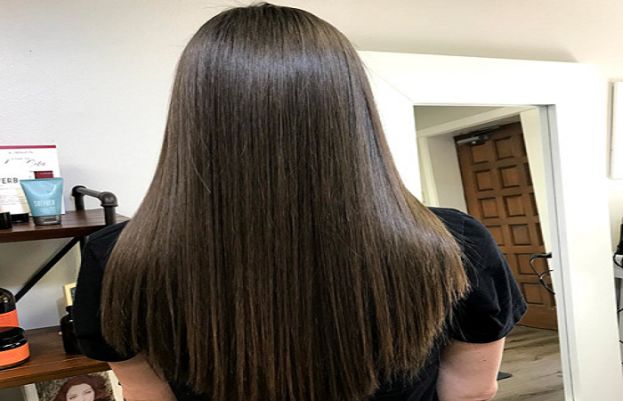[ad_1]

That pixie cut seemed like a good idea at the time. But now you’re staring in the mirror, and the reflection looking back is more, “Eek!” than chic.
Is there anything (anything?!) you can do to speed up the growing-out process? Dermatologist Wilma Bergfeld, MD, gives us the long and short of it.
How fast does hair grow?The hair on your head grows in cycles. At any time, about 80% of your hair is actively growing. The remaining strands are in either a resting state or preparing to die and fall out.
If your hair is shedding like crazy, see your doctor to rule out any illnesses or nutrient deficiencies that might be responsible. But if scissors — not shedding — are at the root of your problem, you’ll have to summon some patience: Hair grows a measly 4 to 6 inches per year.
Tips to make your hair grow faster
The internet “experts” may be in love with that inversion method (where you hang your head upside down for a few minutes to, theoretically, promote blood flow to your scalp and grow your mane), but scientists haven’t tested it out yet.
When you want your hair to hurry up and grow already, Dr. Bergfeld recommends these proven methods:
1. Get checked by a doctor for deficiencies
“Take care of your health issues,” she says. Hormonal abnormalities, anemia and other nutrient deficiencies can short-circuit the growth pattern. Dr. Bergfeld recommends having your doctor do some tests to identify any possible deficiencies.
2. Eat a balanced diet
A well-rounded, nutritious diet is important for head-to-toe health, including the hairs on your head. Avoid diets that cut out entire food groups, Dr. Bergfeld cautions. And if you follow a vegetarian or vegan diet, make sure you’re getting all the protein types and nutrients your body needs. Your doctor or dietitian can help you create a well-balanced eating plan.
3. Try out some vitamins and supplements
Give your locks a boost with the nutrients that matter most for hair growth. A well-balanced diet can include these vitamins (and more). You can also consider oral supplements to ensure you’re getting the full menu of hair-growing nutrients.
Some of the biggies include:
B vitamins.
Iron.
Omega-3 fatty acids.
Vitamin D.
Zinc.
In addition to these long-studied vitamins, there are some new supplements that Dr. Bergfeld says have shown good results in clinical studies.
What about biotin or collagen?
Both biotin (aka vitamin B7) and collagen are frequently touted as go-tos for strengthening your hair (nails and skin, too). Dr. Bergfeld says both may be useful when you’re looking to grow your locks.
“Biotin improves hair growth and helps with inflammation,” Dr. Bergfeld notes. “The hair follicle, the skin and the nails all benefit.”
Get your fill of B7 from foods like eggs, fish, meat, seeds, nuts, sweet potatoes, broccoli and cauliflower, or try out a mega-B vitamin.
Likewise, Dr. Bergfeld says collagen supplements have recently shown strong results in initial clinical studies, but more research is needed. Collagen is a protein that supports healthy skin, cartilage, bones and connective tissue.
4. Use color and chemical treatments with caution
Hair that’s weak and damaged will break long before it reaches great lengths (or even medium lengths). Avoid bleach and chemical treatments that can damage hair.
5. Keep it cool
Like chemicals, heat styling can damage your hair. Try to avoid frequent blowouts and step away from the curling iron. If you can’t resist, use a heat protectant before you style.
6. Know your hair type
Fine, coarse, curly, colored — different hair types have different needs. If your hair is dry, for instance, wash it less frequently and use a heavier conditioner. If your hair is fine or very curly, it can be easily damaged. Avoid brushing while it’s wet and use products designed for your hair type.
7. Get trims
Scheduling a haircut can feel counterproductive when you want your hair to get longer. But regular trims keep hair from breaking and getting even shorter, Dr. Bergfeld notes.
“Split ends run up the hair fiber like a rip in your stockings. You need to clip those off,” she adds.
8. Pamper your scalp
Look to the root of the problem, Dr. Bergfeld suggests. “If your scalp is itchy or flaky, that translates to inflammation, which turns off hair growth.” To keep your scalp happy, try anti-dandruff shampoos or avoid heavily fragranced shampoos and conditioners, which can irritate sensitive skin. “If your scalp is healthy, your hair will be the best it can be,” she says.
What about rice water for hair growth?
The science isn’t proven, but ancient Japanese legends claim that rinsing your mane with rice water is key to flowing tresses. At least anecdotally, there seems to be some benefit to this generations-old pro-tip. Why could it work? Rice includes the antioxidant inositol, which is known as a hair rejuvenator.
Hair products to avoid
Dr. Bergfeld adds that it’s best to skip shampoos and serums that claim to contain hair-growing vitamins. “Those don’t penetrate the skin or hair well,” she explains.
Sadly, there’s no magic formula to transform you into Rapunzel — at least not yet. “Major cosmetic houses have some of the best chemical scientists in the world,” she says. “Lots of researchers are working on this.”
[ad_2]
Source link






